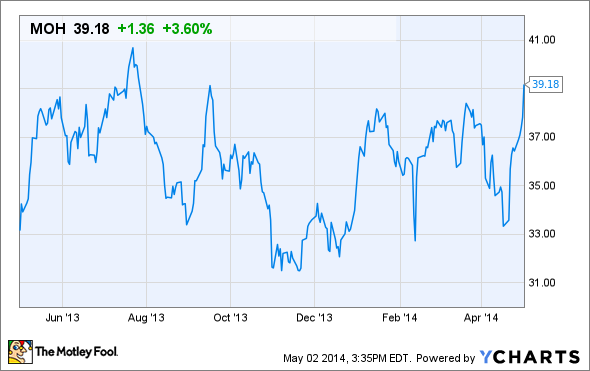By now, most of us have read somewhere that the Affordable Care Act -- Obamacare -- could be bad for business. Clearly, an argument can be made that requiring employers with 50 or more employees to offer insurance, or pay a penalty, could prove onerous.
But while Obamacare is creating hurdles for some, it's also proving a big boon to others. In fact, Obamacare may be the biggest gift to private Medicaid insurers since legislation granted them the right to exist in the 1980s.
That's because more and more states have shifted their Medicaid programs to third-party private companies like Molina Healthcare (MOH +0.84%), UnitedHealth Group (UNH +1.30%), and Aetna (AET +0.00%).
Collectively, those three companies administer State Medicaid programs covering more than 10 million people. And since those plans get paid by the member, Obamacare's Medicaid expansion is providing plenty of new revenue for them.
Continuing the winning streak
Molina is the latest of the major Medicaid insurers to report better-than-hoped first-quarter results.
During the first quarter, membership in Molina's insurance plans grew 11% compared to the fourth quarter as Molina added more than 130,000 new people to its Medicaid rolls.
The jump in membership lifted the company's sales 21% between the fourth and first quarters to $2.1 billion.
That matches up nicely with reports out of WellPoint, UnitedHealth Group, and Aetna, which also showed significant growth in Medicaid sales.
At UnitedHealth Group, Medicaid revenue grew 17% to $5.2 billion as Medicaid enrollment expanded by 255,000 people.
And Aetna's acquisition of Coventry Health last May, coupled with Medicaid expansion, helped its government revenue grow from $2.6 billion last year to $5.1 billion in the quarter.
Noisy earnings results
Molina's bottom-line results were arguably the noisiest among these insurers because of one-time items that weighed down earnings per share during the quarter.
Molina said its earnings per share of $0.09 would have been roughly $0.40 better if not for three things:
- Expenses for which no revenue was recognized = $0.19.
- Partial, rather than full, reimbursement of the Health Insurer Fee (or HIF) = $0.15.
- Failure to recognize a portion of Texas' health plan quality incentive revenue = $0.06.
While finger-pointing is never a good thing for shareholders to rally around, investors should take solace knowing that the company expects its G&A expenses to fall throughout the year, that it's guardedly optimistic it can ink HIF contracts with various states by year end, and that it thinks it has a good shot at recognizing the Texas incentive revenue by year end, too.
As a result, Molina kept its full year 2014 guidance intact at $4 to $4.50 per share. If it can hit those projections, it will be one of the better year-over-year performers in terms of earnings in the health insurance industry.
|
2013 Actual |
2014 Est (Midpoint) |
% Change | |
|---|---|---|---|
|
Molina |
$3.13 |
$4.25 |
35.78% |
|
United |
$5.50 |
$5.50 |
0.00% |
|
WellPoint |
$8.52 |
$8.40 |
-1.41% |
|
Aetna |
$5.33 |
$6.45 |
21.01% |
Source: Yahoo! Finance and author's calculations.
Fool-worthy final thoughts
Only 26 states (plus DC) approved the expansion of Medicaid, so providers within those states saw the biggest advantage. Given that California is one of the largest Medicaid markets, and Molina's biggest market overall, the fact the state embraced Obamacare contributed nicely to Molina's results. That contribution may continue, as the state is still working through a backlog of 900,000 Medicaid applications.
According to the Centers for Medicare and Medicaid Services, more than 3 million people signed up for Medicaid following expansion last fall. How many more will sign up from here remains a question; however, it would seem that Medicaid enrollment numbers are set to provide tailwinds for Molina, United, and Aetna this year. Especially if they can bring down administrative and health care costs relative to premiums.








